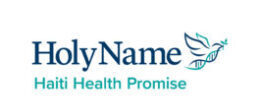By Treasa K. Smith
The HSC clinical laboratory staff consists of 15 full-time, lab technicians. In Haiti, in order to become a lab technician, students attend a medical technology/laboratory science school for 3 years post –secondary education. To complete their training, students do clinical rotations in selected hospitals throughout Haiti.
| 2013 | |
| Grand total of tests performed | 11,9951 |
| Grand Total of Patients/Specimens Collected | 26618 |
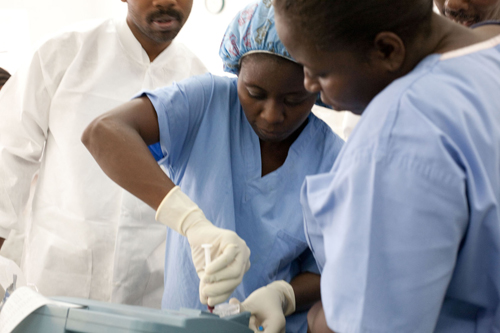 The HSC lab Chief of Service has many years of experience and has spent his career working in the HSC clinical lab. He has witnessed many changes and has been part of the progress required to make the lab accessible to patients for specimen collection and processing, specimen analysis and the final collation, interpretation and reporting of results to clinicians.
The HSC lab Chief of Service has many years of experience and has spent his career working in the HSC clinical lab. He has witnessed many changes and has been part of the progress required to make the lab accessible to patients for specimen collection and processing, specimen analysis and the final collation, interpretation and reporting of results to clinicians.
The lab is open 24/7 and provides essential data and information to clinicians trying to improve the health status of the Haitian people seeking treatment and care at the hospital.
Quality Management and HSC Clinical Lab
A well functioning laboratory is an integral part of any successful hospital operation. In the USA approximately 70-75% of clinical decisions rely on results that are generated by the hospital laboratory. Therefore, the accuracy of all lab results is essential in assuring safe and effective patient care. To promote accuracy, the concept of Quality Management (QM), where quality control (system that ensures high standards of operation), quality assurance (excellence in performance) and quality improvement (process improvement) is practiced.
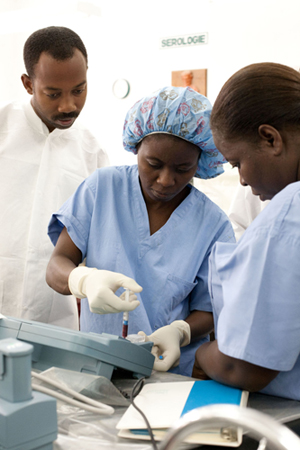 The aforementioned three components of QM are pursued in the HSC laboratory setting because of the labs focus on the ultimate goal of patient safety.
The aforementioned three components of QM are pursued in the HSC laboratory setting because of the labs focus on the ultimate goal of patient safety.
Not unlike clinicians in the USA, clinicians practicing at HSC, whether Haitians or visiting, volunteer medical teams rely on the lab results generated by the HSC clinical lab to manage the many, local and regional patients that daily descend on the hospital. And for this reason, the lab has a QM system in place both to verify and assure accurate results and to streamline the workflow from collection of patient blood specimens, to analysis of the specimen, to the final reporting of patient results.
Clinical Services Provided by the HSC Clinical Lab
The relevance of the HSC lab and how it contributes to patient management and care can be found in the following examples:
• The most notorious malaria parasite, P. falcipaurm is endemic to Haiti. And if early detection is not made, the patient can quickly become a fatality when the parasite gains access to the brain. The HSC lab has the capability of diagnosing malaria quickly and with great accuracy because we use a Rapid Diagnostic Test (RDT). This test is then followed by the blood smear review to stage the growth cycle of the parasite. All of this information allows the clinician to start the patient (frequently children) on the proper course of treatment.
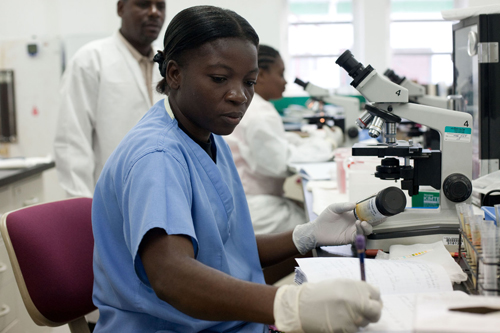 • Bacterial meningitis is another fatal disease and the lab can quickly diagnose this malady by examining the cerebral spinal fluid (CSF) of the patient. The fluid is examined microscopically for increases in white blood cells (WBC). A slide is also made, stained and examined microscopically for the bacteria. Antibiotics can save the patient and selecting the drugs will be based on the lab generated result.
• Bacterial meningitis is another fatal disease and the lab can quickly diagnose this malady by examining the cerebral spinal fluid (CSF) of the patient. The fluid is examined microscopically for increases in white blood cells (WBC). A slide is also made, stained and examined microscopically for the bacteria. Antibiotics can save the patient and selecting the drugs will be based on the lab generated result.
• Recently, an HSC patient required a heart valve replacement with a mechanical valve. An important test offered by the lab is the Prothrombin Test (PT) which monitors the effectiveness of the anti thrombotic (anti-blood clot formation) drug therapy the patient must be on to survive. The patient comes to HSC frequently to have her blood specimen collected by the lab and through PT testing, it is determined if the patient is in the therapeutic range of drug which diminishes her risk for thrombosis (clot formation).
• HIV patients require careful monitoring of their T-cell CD 4 count. This result indicates to the clinician whether or not the medication being prescribed the patient is working to prevent the HIV viral infection from advancing to full blown AIDS which ultimately leads to patient death. The lab has the capability of delivering the CD 4 count on the same day the blood specimen is taken. This makes the management of the patient swift and safe. Soon viral load testing will be available at the HSC lab. This data will further refine the management of each HIV patient.
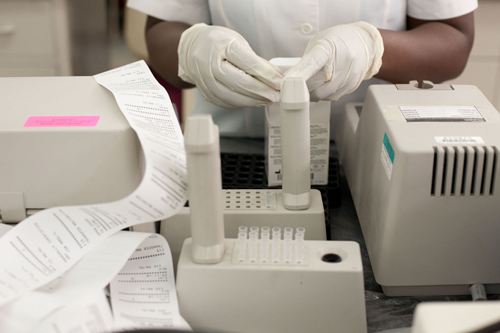 • Tuberculosis (TB) is a troublesome disease and very prevalent in Haiti. The lab will soon be able to perform a more sensitive method of detection of the mycobacterium organism in sputum and also test for mycobacterium antibiotic resistance. This technology will advance the care and treatment of the patient suffering with this debilitating disease.
• Tuberculosis (TB) is a troublesome disease and very prevalent in Haiti. The lab will soon be able to perform a more sensitive method of detection of the mycobacterium organism in sputum and also test for mycobacterium antibiotic resistance. This technology will advance the care and treatment of the patient suffering with this debilitating disease.
• Hemoglobin is the bio molecule that carries oxygen in the body. The lab operates instruments that provide fast and accurate readings of a patient’s hemoglobin level. This result is especially important for anemic patients and patients that have lost blood during the delivery of a child or as the result of a trauma.
The lab generated results are used by clinicians to order units of blood for transfusion from the HSC blood bank. Such an intervention, the transfusion of blood, can save a person’s life.
• A regional blood bank donor center operates as part of the lab. Units of valuable blood for transfusion are available for both HSC patients and also regionally as clinics and other hospitals frequently call the HSC donor center to determine if units needed for emergency transfusions can be provided by the HSC blood bank. If so, the units are taken by courier to the site ordering the units of blood for transfusion into the patient.
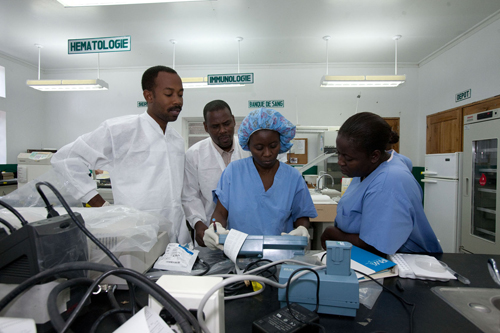 • Other essential laboratory testing that are part of the lab test menu is as follows:
• Other essential laboratory testing that are part of the lab test menu is as follows:
-Examination of stools for parasites
-Serological tests for typhoid, H. pylori and syphilis
-Chemistry and sediment analysis of urine
-Complete chemistry panels
-Gram Staining of material from wounds
WISH LIST! New Chemistry Analyzers Needed for HSC Lab
Overall increase in volume of testing at the HSC clinical lab reclassifies the operation from a low volume to a medium volume lab. The majority of the tests conducted onsite are chemistry tests that require the use of specific equipment. The current analyzer system that has been in place since 2001 uses dry slide chemistry technology which is more expensive than the new technology of wet chemistry. Complicating matters further, HSC received notice from the manufacturer that after 2014 technical support will no longer be available and the reagents used will no longer be manufactured. Making matters even dimmer, two of the four chemistry analyzers in use have been taken out of service permanently and the remaining duo show increasing signs of failure.
Clearly, the laboratory constitutes a critical center for the functioning of the hospital. The purchase of two modern chemistry analyzers has become a critical priority.
After many months of careful evaluation of suitable instruments by a team of techs who understand the needs of HSC, by Sister Marie Vittetoe (HSC laboratory consultant for 12 years) and by two representatives of the National Public Health Laboratory of Haiti, a replacement analyzer that will perform all the required tests, has been identified. It will reduce tech time, decrease turnaround time of result reporting and be cost saving. An all inclusive price for setting up, instructing, and maintaining service contracts for the instruments at HSC lab would be between $45-50,000.
If you or your group can help with this critically needed purchase, please contact Dr. Joni Paterson at the CRUDEM Foundation. 413-642-0450 or info@crudem.org.
